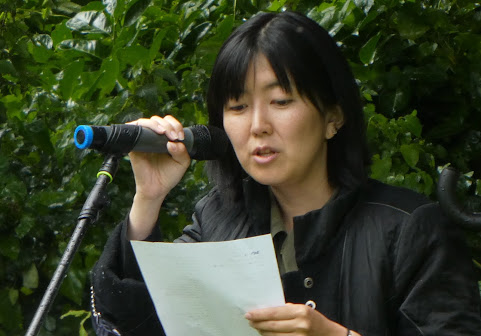On Wednesday 6th August 2025, Irish CND marked the 80th anniversary of the Hiroshima bombing, holding the annual commemoration ceremony at the memorial cherry tree in Merrion Square in Dublin.
Welcoming the largest attendance for several years, Irish CND chairperson Dr David Hutchinson Edgar reminded them of the unimaginable horrors inflicted 80 years previously and evoked the determination of those present not just to remember, but to do all they can to ensure such events can never happen again, noting the role Ireland has played in recent years in the development of the Treaty on the Prohibition of Nuclear Weapons.
Speaking on behalf of the people of Dublin, Deputy Lord Mayor John Stephens spoke of how it is imperative not only that nuclear weapons are never used, but that the threat of nuclear warfare needs to be removed from international political and military discourse. "Let the world move on to be a better place to live, to work, to grow old, and rear our families, without the threat of nuclear war," he said.
Chargé d'Affaires at the Japanese embassy in Ireland, Mr Norimasa Yoshida, thanked Irish CND for organising the ceremony. Referring to the visit to Dublin last year of the Mayor of Hiroshima, he repeated the message of the bomb victims of 1945, that they must be the last ever to experience the utter horror of a nuclear attack. Diplomats from Austria, Brazil, Egypt, New Zealand, South Africa and Ukraine also represented their countries at the ceremony.
Irish CND vice-president, Adi Roche, paid tribute to eight decades of both suffering and campaigning for peace on the part of the hibakusha (literally, "explosion-affected people") of Hiroshima and Nagasaki:
"Those wonderful people, the Hibakusha, by their speaking out and giving witness are our teachers encouraging us towards Courage. They are our teachers in leading us to Conviction. They are our teachers of Care, Compassion and Love, encouraging us all, inspiring us today to take up the struggle for peace and nuclear disarmament, ensuring that horrors like Hiroshima and Nagasaki will never happen again."
She continued: "The personal stories of the Hibakusha humanise history and lift the veil of our forgetfulness and call us to remember and learn. Their stories bridge that gap between those who were there and those of us who are untouched by the violence of these events. The Hibakusha help us describe the indescribable, to think the unthinkable, to somehow grasp the incomprehensible pain and suffering caused by nuclear weapons. The Hibakusha are the living reminders of what is at stake: our humanity, our civilisation; we are perilously close to the precipice."
 |
Extracts from the Nobel Peace lectures by Setsuko Thurlow (on behalf of ICAN, 2017) and Terumi Tanaka (on behalf Nihon Hidankyo, 2024) describing their eyewitness recollections of the immediate aftermath of the bombings, were read by Barbara Comerford (Irish CND) and Joe Murray (Afri). Poet Eriko Tsugawa read the poem "At the makeshift aid station" by Toge Sankichi. Eight white roses were laid at the base of the cherry tree as the names of eight victims of the bombings were read out, symbolically representing both the eight decades since 1945, and the 80,000 men, women and children killed on 6th August 1945.







